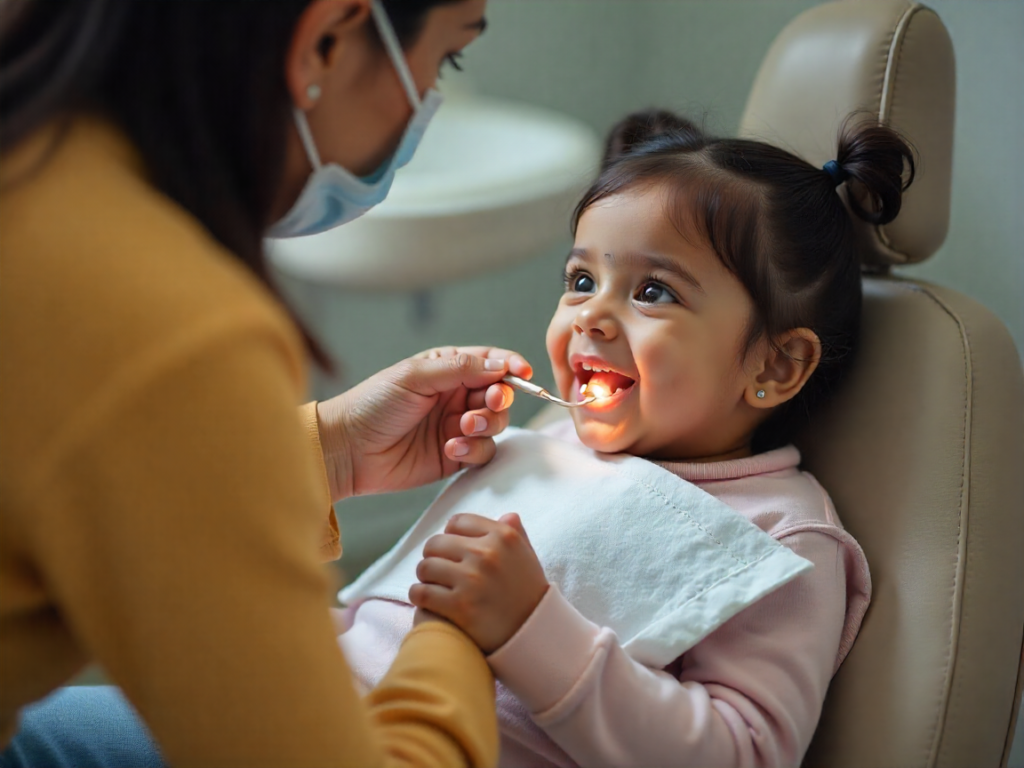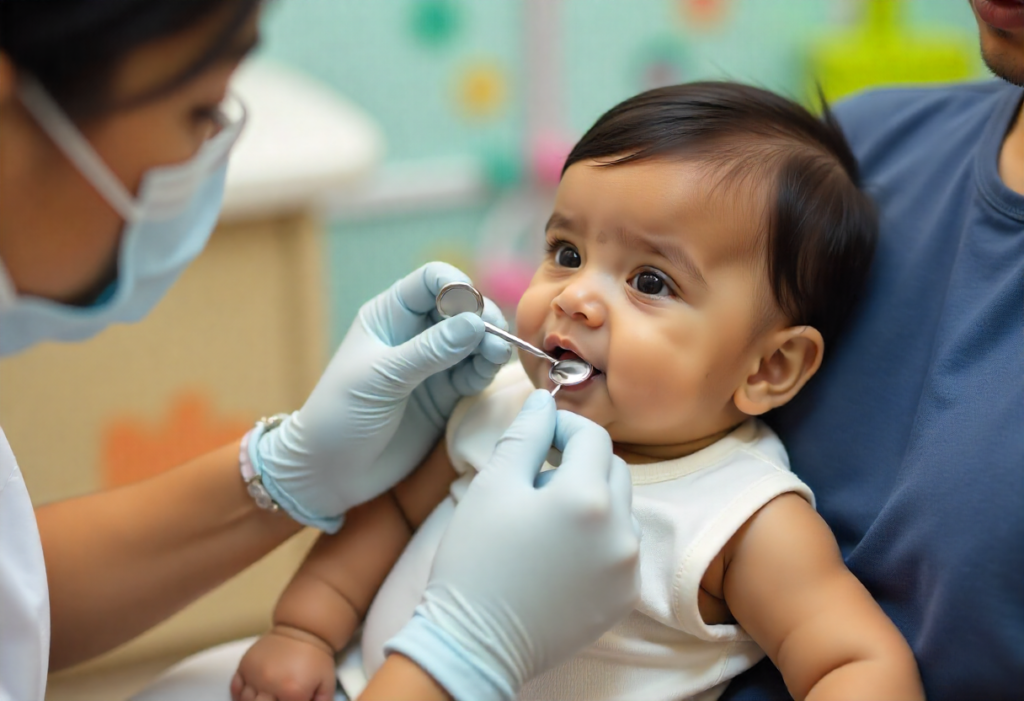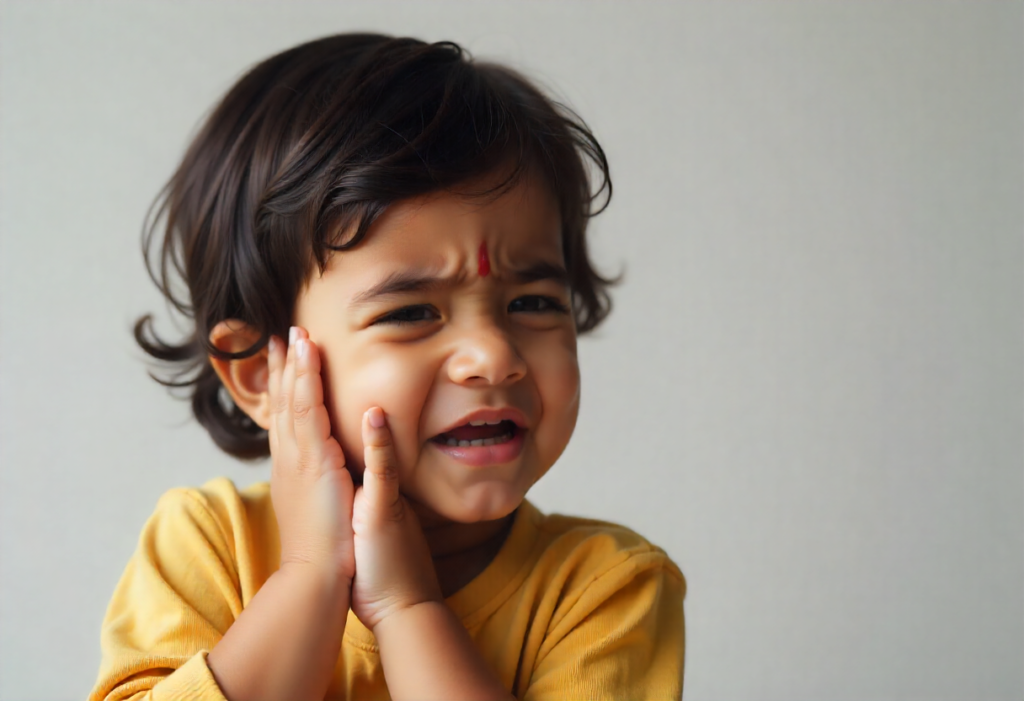
Baby Teething – Signs, Symptoms, and Remedies
Your baby’s first tooth is an exciting milestone, but teething can also bring discomfort, fussiness, and sleepless nights. Knowing the signs of teething in babies, common symptoms, and safe teething remedies can make this stage easier for both you and your little one.
At We Little, India’s first preventive pediatric dentistry clinic, along with Shishuka Children’s Hospitals, we’re here to guide you with expert tips to keep your baby comfortable and support their oral health during this important phase.
Understanding the Kid's Teething Process
Teething, also called odontiasis, is the natural process of a baby’s teeth pushing through the gums. While it can cause some discomfort, it’s an important part of healthy growth and development. Babies are born with 20 primary teeth hidden beneath the gums, which gradually erupt following a predictable timeline.
The first teeth to appear are usually the lower front teeth (central incisors), followed by the upper front teeth. This often happens between 6–10 months of age, but timing can vary. Some babies may start teething as early as 3 months, while others may not get their first tooth until after their first birthday. Both are normal. By around age three, most children will have their full set of 20 primary teeth.
Common Signs and Symptoms of Teething
Teething symptoms can vary widely, some babies hardly notice, while others struggle with discomfort. Recognizing the common signs of teething in babies can help parents provide comfort and care.
- Increased Drooling: One of the earliest signs of teething is excessive drooling. This can sometimes lead to a rash or chapping around the mouth, chin, and chest. Drooling is a natural response as teeth begin to push through the gums.
- Irritability and Fussiness: The pressure from an emerging tooth can cause pain, making babies cranky, clingy, and harder to comfort.
- Chewing and Gnawing: Babies often chew on fingers, toys, or pacifiers to ease gum pressure. This counter-pressure provides temporary relief.
- Swollen, Red, or Tender Gums: Gums may appear red, swollen, or bruised. Running a clean finger along the gumline may reveal a small bump or ridge where a tooth is about to erupt.
- Disturbed Sleep Patterns: Teething discomfort can affect sleep, causing babies to wake more often during the night.
- Slightly Elevated Temperature: A mild increase in body temperature may occur, but teething does not cause a high fever (over 100.4°F / 38°C). A higher fever should be checked by a pediatrician at Shishuka Children’s Hospitals.
- Refusal to Eat: Sore gums can make sucking or chewing painful, leading to temporary refusal of food or even milk.
- Pulling on Ears or Rubbing Cheeks: Because gum and ear nerves are connected, teething pain may cause babies to pull their ears or rub their cheeks.
- Loose Stools and Diaper Rash: Some parents notice these during teething, though there’s no proven direct link. Drooling and swallowing saliva may play a role, but diet or infection can also be factors. Always consult your pediatrician if symptoms are severe.
Note on the Timing of Symptoms: Baby’s Teething symptoms often appear a few days before a tooth erupts and usually improve once the tooth breaks through.
Effective and Safe Remedies for Teething
Once you recognize the signs of teething, the next step is finding safe ways to ease your baby’s discomfort. Here are some effective and pediatrician-approved teething remedies:
- Gentle Gum Massage: Wash your hands thoroughly and rub your baby’s gums with a clean finger. The light pressure helps relieve soreness.
- Chilled Teething Toys or Cloths: A cool (not frozen) teething ring, pacifier, or a damp washcloth from the refrigerator can numb the gums and reduce inflammation. Avoid frozen items, as they may hurt delicate gums.
- Teething Rings: Choose BPA-free, solid, durable teething rings. Avoid liquid-filled ones since they can break and leak.
- Counter-Pressure: Babies naturally want to chew. Offer safe, non-toxic chew toys designed for infants to ease the pressure.
- Keep Drool Under Control: Wipe away excess drool with a soft cloth to prevent rashes. Applying a gentle baby moisturizer or lanolin-based cream can protect the skin.
- Pain Relievers (Consult Your Doctor): If your baby is very uncomfortable, ask your pediatrician at Shishuka Children’s Hospitals about infant acetaminophen or other safe pain relief. Never give aspirin to babies.
- Cold Foods: Soft, chilled foods like yogurt, applesauce, mashed bananas, or unsweetened smoothies can soothe gums while providing nutrition.
- Distraction and Cuddles: Extra cuddles, a change of scenery, new toys, or singing can calm your baby and shift their focus from the pain.
What to Avoid: Unsafe Teething Remedies
Knowing what not to use is just as important as finding safe ways to soothe your baby’s gums. Some popular or traditional remedies can actually be harmful. Here are teething practices to avoid:
- Topical Anesthetics and Teething Gels: Products with benzocaine or lidocaine are unsafe for infants. The FDA warns they can cause methemoglobinemia, a rare but serious condition that reduces oxygen in the blood. They may also numb the throat and affect swallowing.
- Amber Teething Necklaces or Bracelets: These necklaces are marketed to release a substance that acts as an anti-inflammatory when warmed by the baby's body. However, they pose a significant risk of strangulation or choking if they break. The FDA and AAP recommend against their use.
- Homeopathic Teething Tablets: The FDA has also warned against certain homeopathic teething tablets, which have been found to contain inconsistent amounts of belladonna, a toxic substance.
- Frozen Objects: While chilled is good, frozen is not. Frozen teething toys or foods can be too hard for a baby’s sensitive gums and may cause tissue damage.
- Sugary and Sweetened Remedies: Avoid dipping pacifiers or teething rings in honey, sugar, or sugary drinks. These can lead to early childhood tooth decay, even before the teeth have fully erupted. Note that honey should never be given to infants under one year of age due to the risk of botulism.
Oral Hygiene During Teething
Teething is the ideal time to start building healthy oral care habits. Even before the first tooth appears, gently wipe your baby’s gums with a clean, soft cloth. Once that first tooth erupts, brushing becomes essential.
- From First Tooth to Age 3: Brush your baby's teeth twice a day with a soft-bristled, child-sized toothbrush and a smear (about the size of a grain of rice) of fluoride toothpaste.
- First Dental Visit: The American Academy of Pediatric Dentistry recommends that a baby’s first dental visit should be by their first birthday or within six months of the first tooth erupting. At We Little, we specialize in making this first visit a positive and gentle experience. Our pediatric dentists can provide personalized advice on oral hygiene, diet, and teething remedies, while also monitoring your child’s oral development.
When to Seek Medical Advice
While teething is a normal part of development, it’s important to know when to call your doctor. Contact your pediatrician at Shishuka Children’s Hospitals if your baby:
- Develops a high fever (above 100.4°F or 38°C).
- Has severe diarrhea, vomiting, or a significant rash.
- Shows signs of an ear infection or other illness.
- Is inconsolable or seems to be in extreme pain.
- Has symptoms that last for more than a few days without a new tooth appearing.
We Little and Shishuka Children's Hospitals: Your Partners in Care
The journey of parenthood is filled with questions and milestones. Teething is just one of many, and it’s our privilege to be your partners in providing the best possible care for your child. Our collaboration ensures a holistic approach, where the specialized pediatric dental care of We Little is seamlessly integrated with the comprehensive medical expertise of Shishuka Children’s Hospitals.
From gentle guidance on teething to proactive preventive dental care, we are here to support you every step of the way. By being informed, prepared, and compassionate, you can help your baby through the teething phase and set the foundation for a lifetime of happy, healthy smiles. We look forward to welcoming you and your little one to our clinics.
Related Post







Book an Appointment for Baby Teething Care
Worried about baby teething symptoms and remedies? Our experts at We Little and Shishuka Children’s Hospitals provide safe, gentle solutions and preventive dental care. Schedule a visit with our pediatric dental experts today!
Book Appointment NowContact us

